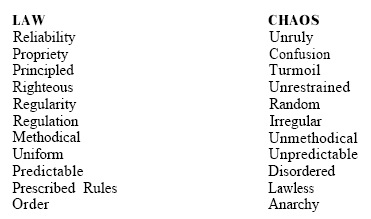... by the way ...
I think one nuance that's partly missing from the conversation has to do with law and the breaking thereof. I think a lot of the time we just assume that by "law" we mean "the law of the land." That's not what Law in D&D means though, even apart from the cosmic dimension that was already mentioned.
Example? An old-school Mafia style crimelord. He could easily be a Lawful Evil villain even though he literally lives on breaking the laws of the land. Why? Because he has a different set of laws he strictly adheres to. These could be omertà, honour, loyalty (to the crime family), retribution (to its enemies), and so on and so forth.
This is relevant for Lawful Good characters as well: the code of conduct a Lawful Good character could very well come into conflict with the laws of the land, especially if the laws of the land were at all Evil. In that case, breaking the laws of the lands in order to adhere to the laws the Lawful Good character willingly and whole-heartedly follows is, itself, a Lawful act.
(This is another angle which could justify rebellion against an evil tyrant as a Lawful Good act -- always assuming there is intent and a plan to establish a Lawful Good order after he's gone.)
The "personal code of conduct" thing is IMO "controversial". I've always interpreted "Lawful" as a character that follows an
objective set of rules that
existed before him and have actual
"jurisdiction" over him. As in, if you're born in "Fictional Kingdom X" then you're a subject of "King X" and you
should (at least in theory) obey his laws. If you think his laws should be obeyed to avoid jail, you're neutral. If you think his laws
must be obeyed because everyone should obey his king, you're lawful. If you couldn't give less of a fuck about the king OR his laws, you're chaotic. So far so good, but if you pull a brand new set of rules out of your ass and decides to follow them instead of the King's laws, then you're still a chaotic character. If you find other people willing to follow your new set of rules, you're a chaotic
leader of a criminal organization. Because you're not the King, boyo.
OTOH, if instead of being a random dude from Kingdom X you're actually part of a secluded group of hardcore loyalists of King Y, the descendant of the original ruler of the land before King X's ancestors conquered your people and took your lands, then you can break each and every one of King X's laws while still being a Lawful character. Because you actually follow King Y's laws, which are different. But, again: you didn't pull them out of your ass.
Subcultures (like the Mafia) are a WHOLE different dilemma, since you have a mixture of conflicting Laws that should bind you. I still don't think a mobster can possibly be considered "Lawful" since the Mafia is
not a completely different society (like my previous example), but rather a minor group that still fits into the major group without splintering away from it. Mobsters remain part of the society at large, they still send their kids to school, buy groceries etc. This conflict of cultures doesn't really work into the ruleset because it doesn't really work in real life either. These people bend and break their own set of "Laws" the moment it becomes profitable to do so. IMO a super strict "never betray the family" mobster would be NE, while the average "no honor among thieves" type would be CE. And yes, Evil. Because they rob, steal and murder for their own benefit. Which means Evil, lol.
TL;DR: Dexter Morgan is NOT a Lawful character.




















